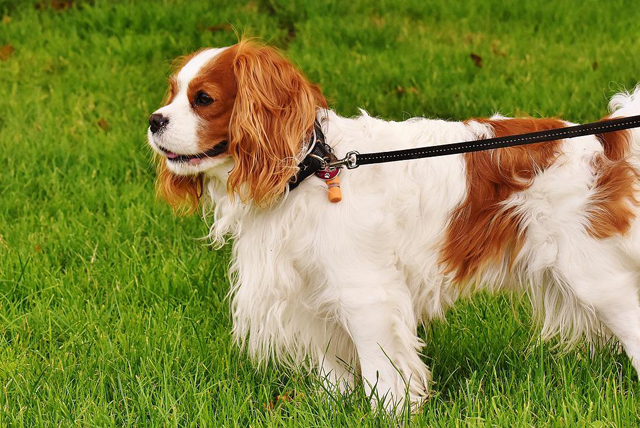iHeartDogs is reader-supported. When you buy via links on our site, we may earn an affiliate commission at no extra cost to you.

As someone who grew up with Cavalier King Charles Spaniels, I can’t possibly say enough good things about the breed. I mean, these indescribably cute fluffy sweethearts were literally bred to cuddle; they’re lapdogs by design. Cavaliers love people, and that’s why people love Cavaliers.
Unfortunately, the Cavalier King Charles breed is predisposed to certain medical conditions. While these health issues can be expensive to treat, you may be able to cover the high costs if you invest in pet insurance for your dog early.
It’s easy to feel overwhelmed when it comes to choosing the right pet insurance plan for your beloved Cavalier. This guide will help you select a plan that covers everything you want it to, so you can be there for your dog when they need you most.
Compare The Top 9 Pet Insurance Plans for Your Cavalier Using our Free No-Obligation Quote Tool below
The simplest way to compare pet insurance prices is to use our tool below. The comparison tool will show you quotes from the top 9 pet insurance carriers, including Trupanion, Pets Best, Lemonade, ManyPets, FIGO, HealthyPaws, Prudent Pet, Spot, and Embrace pet insurance.
How Much Does Pet Insurance for a Cavalier Cost?
Below are some sample pet insurance plans for a 1-year-old male Cavalier using the zip code 75001 (Texas) as an example.
- Pets Best – $47.01 per month
- Embrace – $35.77 per month
- Healthy Paws – $27.81 per month
- ManyPets – $42.99 per month
Ultimately, your plan’s premium will depend on several factors, including your dog’s age, size, and breed, as well as where you live. You also want to know what type of coverage your plan has and if it will help with Cavalier-specific health problems. Let’s get more into those medical conditions and how much you can expect to pay to treat them.
Common Health Problems Associated With Cavaliers
Mitral Valve Disease in Cavalier King Charles Spaniels
The most commonly seen genetic health issue in Cavaliers, mitral valve disease, begins as a heart murmur that progresses into heart failure. When the valve separating the two left heart chambers fails to form a tight seal, the heart must work harder to pump blood through your dog’s body.
Surgery can’t always resolve the issue, but pharmacological treatments paired with regular veterinary follow-ups can keep your dog’s heart condition stable.
A study published in Canine Medicine and Genetics Journal found heart murmurs in 30.9% of the 541 Cavaliers included in the research. Ideally, dogs screened for this condition should not be bred.
Syringomyelia in Cavalier King Charles Spaniels
This condition common in Cavaliers occurs when cavities form in the dog’s spinal cord and fill with fluid due to abnormal pressure in the skull. Cavaliers’ relatively small skulls can obstruct the flow of cerebrospinal fluid.
Syringomyelia can cause severe head and neck pain. In some cases, it can lead to paralysis. Ongoing medical management can give affected dogs a good quality of life for at least two years. Surgery has an 80 percent success rate in reducing pain.
Signs of syringomyelia include:
- Scratching the back of the neck
- Sensitivity to touch around the neck
- Pain that causes whimpering or yelping
These signs are usually seen in Cavaliers between 6 months and three years old, but dogs of any age can start showing symptoms. Syringomyelia can only be diagnosed through an MRI.
Otitis Externa (Outer Ear Infections) in Cavalier King Charles Spaniels
Sadly, Cavaliers’ iconic long, luxurious ears also make them prone to ear infections. There are several causes of ear infections, including allergies, hypothyroidism, trauma, ear mites, and bacteria.
Otitis externa (a.k.a outer ear infection) leads to inflammation in the infected ears. Your dog will experience pain, redness outside the ear canal, and their ears will develop an odor. There may also be a black or yellowish discharge.
Untreated infections can worsen and affect your dog’s hearing or balance.
Patellar Luxation in Cavalier King Charles Spaniels
The most common orthopedic condition for small dogs like Cavaliers, patellar luxation, occurs when the knee is dislocated. Close to 20% of Cavalier King Charles Spaniels will be affected.
Some affected dogs will have a minor limp, while others may end up immobile. Uncorrected, patellar luxation can lead to arthritis later in your dog’s life.
Typical Costs Of Treating Health Issues In Cavaliers and How Pet Insurance Can Help
If left untreated, many of the health conditions listed above can result in long-term consequences and even require surgery, which ultimately makes them more expensive to manage. Selecting a pet insurance plan suited for your Cavalier’s particular needs might save you tons of money on medical costs.
Here are just some sample veterinary expenses for Cavalier King Charles Spaniels:
- Mitral Valve Disease Costs: Diagnosing MVD may require X-rays or a cardiology specialist. Your veterinarian will want to put your dog on medications to manage the condition. These include diuretics for fluid removal and beta-blockers for central blood pressure reduction. Ultimately, MVD will cost you at least hundreds of dollars in medical bills.
- Syringomyelia Costs: Your dog will need an MRI to diagnose the condition (which costs $1,000 to $2,000). Medical management is an option, involving medications (~$50 per month) and adjustments like raised food bowls. Surgery to decompress the cerebrospinal fluid obstruction may be recommended for dogs with severe pain, but it’s very expensive (averaging $5,000- $10,000.)
- Ear Infection Costs: Many dogs will have more than one type of infection present, so treatment will require multiple medications. The average cost of treatment is ~$150. Total Ear Canal Ablation (TECA) is a surgical option that involves removing the ear canal with the diseased tissue to prevent the recurrence of ear infections. Surgery is only necessary in chronic cases but could cost $3,000 – $5,000.
- Patellar Luxation Costs: Treatment for patellar luxation depends on the “grade” of dislocation. If it’s Grade 2 and above, surgery may be needed to correct the issue. That orthopedic surgery could cost thousands of dollars ($1,000-$5,000 on average.)
Knowing the signs and symptoms of these conditions common in Cavaliers can help you catch them early, saving your dog and your money. When in doubt, take your pup to the vet to have them diagnosed.
What Is Pet Health Insurance And Why Do I Need It For My Cavalier?
Pet health insurance works very similarly to human health insurance. Your policy quote will range in monthly price, depending on your dog’s breed, age, and where you live. Typically, you’ll spend around $15-$69 per month as a pet parent.
Pet insurance is mainly about peace of mind, knowing you won’t be totally overwhelmed in case of an emergency. Enrolling even when your dog is young and healthy will ensure you have plenty of coverage when they need expensive medical care later. If you choose a plan more suited to your dog’s particular breed, you’ll be more prepared when something happens later on in their life.

Some plans cover accidents and illnesses, while others only cover accidents. Certain plans do cover breed-specific illnesses, and others do not. It all depends on what type of coverage you choose. With our free pet insurance comparison tool, you can get quotes from multiple insurance companies with no obligation to commit.
Whatever plan you choose, you’ll feel better knowing you can take care of your dog when they need you most. Plus, you won’t have to suddenly shell out thousands of dollars. Learn more about how pet insurance works here.
Pet Insurance Carrier Comparisons
- 9 Best Pet Insurance Plans for Dogs
- Best Cheap Pet Insurance
- Trupanion Vs. Pets Best Pet Insurance
- Trupanion Vs. Lemonade Pet Insurance
- HealthyPaws Vs. Embrace Pet Insurance
- HealthyPaws Vs. Trupanion Pet Insurance
- Embrace Vs. Trupanion Pet Insurance
- Embrace Vs. Lemonade Pet Insurance
- Trupanion Vs. FIGO Pet Insurance
- Prudent Pet Vs. Trupanion Pet Insurance
- Embrace Vs. ManyPets Pet Insurance
- Embrace Vs. FIGO Pet Insurance
- Prudent Pet Vs. Embrace Pet Insurance
- HealthyPaws Vs. ManyPets Pet Insurance
- HealthyPaws Vs. FIGO Pet Insurance
- Prudent Pet Vs. HealthyPaws Pet Insurance
- HealthyPaws Vs. Lemonade Pet Insurance
- Pets Best Vs. ManyPets Pet Insurance
- Pets Best Vs. FIGO Pet Insurance
- Prudent Pet Vs. ManyPets Pet Insurance
- Prudent Pet Vs. Pets Best Pet Insurance
- Embrace Vs. Pets Best Insurance
- HealthyPaws Vs. Pets Best Pet Insurance
- ManyPets Vs. Lemonade Pet Insurance
- Lemonade Vs. FIGO Pet Insurance
- Trupanion Vs. ManyPets Pet Insurance
- ManyPets Vs. FIGO Pet Insurance
- Lemonade Vs. Pets Best Pet Insurance
- Prudent Pet Vs. Lemonade Pet Insurance
- Prudent Pet Vs. FIGO Pet Insurance
Breed Pet Insurance
- Pet insurance for Akitas
- Pet insurance for Alaskan Malamutes
- Pet insurance for American English Coonhounds
- Pet insurance for American Staffordshire Terriers
- Pet insurance for Australian Cattle Dogs
- Pet insurance for Australian Shepherds
- Pet insurance for Basset Hounds
- Pet insurance for Beagles
- Pet insurance for Bernese Mountain Dog
- Pet insurance for Bichon Frises
- Pet insurance for Bloodhounds
- Pet insurance for Border Collies
- Pet insurance for Boston Terriers
- Pet insurance for Boxers
- Pet insurance for Bulldogs
- Pet insurance for Bullmastiffs
- Pet insurance for Bull Terriers
- Pet insurance for Cane Corsos
- Pet insurance for Cavaliers
- Pet insurance for Chesapeake Bay Retrievers
- Pet insurance for Chihuahuas
- Pet insurance for Chinese Crested Dogs
- Pet insurance for Chow Chows
- Pet insurance for Cocker Spaniels
- Pet insurance for Collies
- Pet insurance for Corgis
- Pet insurance for Dachshunds
- Pet insurance for Dobermans
- Pet insurance for Dogue De Bordeaux
- Pet insurance for English Springer Spaniels
- Pet insurance for French Bulldogs
- Pet insurance for German Shepherds
- Pet insurance for German Shorthaired Pointers
- Pet insurance for Goldendoodles
- Pet insurance for Golden Retrievers
- Pet insurance for Greyhounds
- Pet insurance for Great Danes
- Pet insurance for Great Pyrenees
- Pet insurance for Havanese
- Pet insurance for Huskies
- Pet insurance for Jack Russells
- Pet insurance for Labrador Retrievers
- Pet insurance for Labradoodles
- Pet insurance for Lhasa Apsos
- Pet insurance for Maltese
- Pet insurance for Mastiffs
- Pet insurance for Miniature Pinschers
- Pet insurance for Mixed Breeds (small)
- Pet insurance for Mixed Breeds (medium)
- Pet insurance for Mutts
- Pet insurance for Newfoundlands
- Pet insurance for Old English Sheepdogs
- Pet insurance for Papillons
- Pet insurance for Pekingese
- Pet insurance for Pit Bulls
- Pet insurance for Pomeranians
- Pet insurance for Poodles
- Pet insurance for Pugs
- Pet insurance for Rhodesian Ridgebacks
- Pet insurance for Rottweilers
- Pet insurance for Saint Bernards
- Pet insurance for Samoyeds
- Pet insurance for Schnauzers
- Pet insurance for Shar-Peis
- Pet insurance for Shelties
- Pet insurance for Shiba Inus
- Pet insurance for Shih Tzu
- Pet insurance for Staffordshire Bull Terrier
- Pet insurance for Vizslas
- Pet insurance for Weimaraners
- Pet insurance for Westies
- Pet insurance for Whippets
- Pet insurance for Yorkies
Pet Insurance by City
- Pet Insurance in San Diego
- Chicago Pet Insurance
- New York City Pet Insurance
- Pet Insurance in Seattle
- Pet Insurance in Los Angeles
- Pet Insurance in Austin
- Pet Insurance in San Antonio
- Pet Insurance in Miami
- Pet Insurance in Philadelphia
- Pet Insurance in Sacramento
- Pet Insurance in Orlando
- Pet Insurance in San Francisco
- Pet Insurance in Houston
- Pet Insurance in Dallas
- Pet Insurance in Tampa
- Pet Insurance in Pittsburgh
Pet Insurance by State
- Pet Insurance in California
- Pet Insurance in Texas
- Pet Insurance in Florida
- Pet Insurance in Pennsylvania
- Pet Insurance in Washington State
- Best Pet Insurance in Michigan
- State of Delaware Pet Insurance
- Pet Insurance in NC
- Pet Insurance in NJ
- Pet Insurance in Colorado
- Pet Insurance in Ohio
- Pet Insurance in Oregon
- Pet Insurance in Indiana
- Pet Insurance in Oklahoma
- Pet Insurance in Utah
- Pet Insurance in New York
- Pet Insurance in Massachusetts
- Pet Insurance in Arizona
- Pet Insurance in Minnesota
- Pet Insurance in Connecticut
- Pet Insurance in Wisconsin
- Pet Insurance in Hawaii
- Pet Insurance in Iowa
- Pet Insurance in New Hampshire
- Pet Insurance in Alabama
- Pet Insurance in Maine
- Pet Insurance in Maryland
- Pet Insurance in Rhode Island
- Pet Insurance in Arkansas
- Pet Insurance in Illinois
- Pet Insurance in Nebraska
- Pet Insurance in Alaska
- Pet Insurance in Louisiana
- Pet Insurance in South Carolina
- Pet Insurance in Vermont
- Pet Insurance in Georgia

 Toledo, United States.
Toledo, United States.